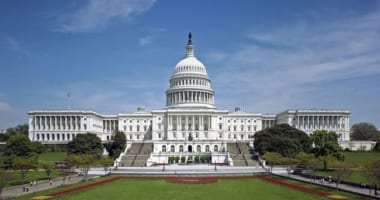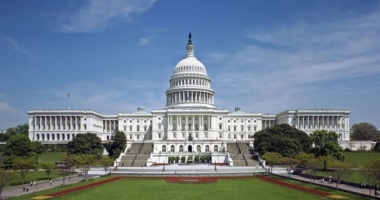- Show all
- Arab Americans/ Muslim Americans
- Climate and Environment
- Conflicts and Conflict Resolution
- Democracy and Governance
- Education and Development
- Energy and Economics
- Global Health and Health Policy
- Identity Politics and Sectarianization
- International Law
- Justice, Equality, and Human Rights
- Media and Technology
- Migrants, Refugees, and IDPs
- Protests and Activism
- Public Opinion
- Regional Relations and Geopolitics
- Religion and Politics
- Security and Defense
- The GCC
- The War in Ukraine
- Top 10 Readings on the Gaza War
- Topic-Test
- US Domestic Politics and Elections
- US Foreign Policy
- Violent Extremism
- Women & Gender Issues
- Washington Policy Weekly

Congress Ramps Up Pressure on Iran in Flurry of Legislative Activity
Apr 22, 2024Ethan Mayer-RichIn the wake of Iran’s April 13 retaliatory strike on Israel, the House and Senate replaced last week’s legislative schedule with one almost entirely focused on…
- Washington Policy Weekly

Biden Reiterates Ironclad Support for Israel Amid Attack from Iran
Apr 15, 2024Ethan Mayer-RichThe Biden administration swiftly declared its “ironclad” support for Israel following news of Iran’s retaliatory attack on Israel, which saw Tehran launch hund…
- Washington Policy Weekly

Israeli Strike on Aid Workers Prompts US Criticism
Apr 8, 2024Ethan Mayer-RichLast week was headlined by news of Israel’s April 1 killing of seven aid workers from World Central Kitchen (WCK), an NGO that has been providing food relief i…
- Washington Policy Weekly

Washington Policy Weekly
Apr 1, 2024Ethan Mayer-RichHouse Democrats urged President Biden to address Israeli settler violence and to increase efforts to halt state-sanctioned demolitions of Palestinian homes in …
- Washington Policy Weekly

The Biden Administration Abstains on Today’s Ceasefire Vote
Mar 25, 2024Ethan Mayer-RichThe UN Security Council (UNSC) approved a resolution on March 25 calling for an immediate ceasefire in Gaza. The resolution, led by the ten non-permanent membe…
- Washington Policy Weekly

Washington Policy Weekly
Mar 18, 2024Ethan Mayer-RichSenators Sanders, Van Hollen, and Merkley urged Biden to “enforce federal law by requiring” Israel “to stop restricting humanitarian aid access to Gaza or forf…
- Washington Policy Weekly

Washington Policy Weekly: US Frustrations with Netanyahu Mount, But Not Enough to Deter Steadfast Support
Mar 11, 2024Ethan Mayer-RichAdministration officials more vocally expressed concerns with Israel’s war on Gaza than they have in recent weeks and months, indicating that the official US n…
- Washington Policy Weekly

Washington Policy Weekly: House Democrats Call for Restored Funding for UNRWA
Mar 4, 2024Ethan Mayer-RichRepresentatives Pramila Jayapal, André Carson, and Jamie Raskin led 47 other members of Congress in calling for full funding for UNRWA. In a letter to congress…
